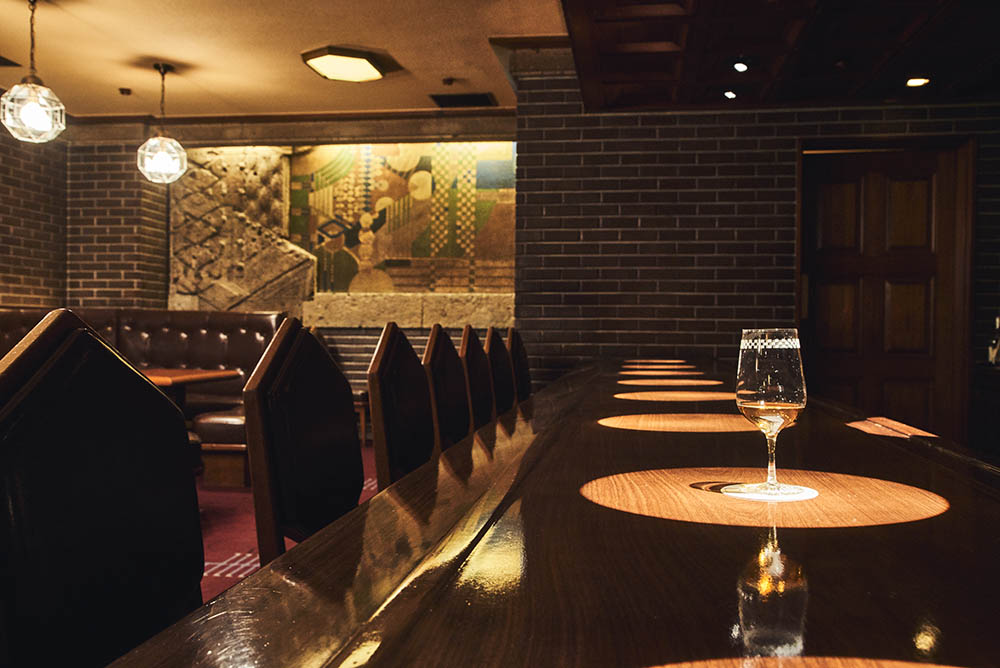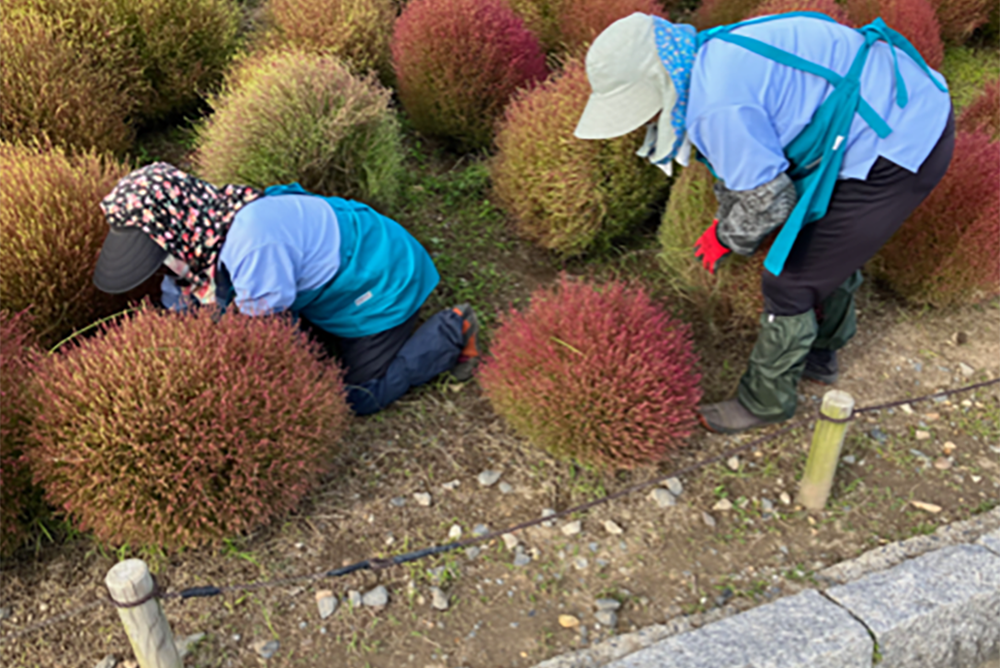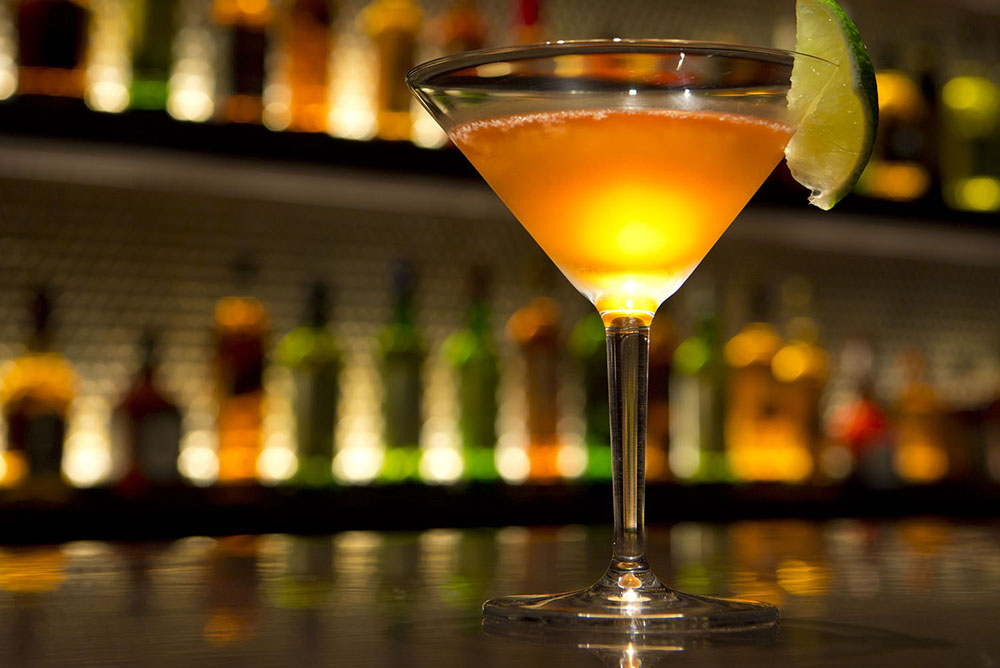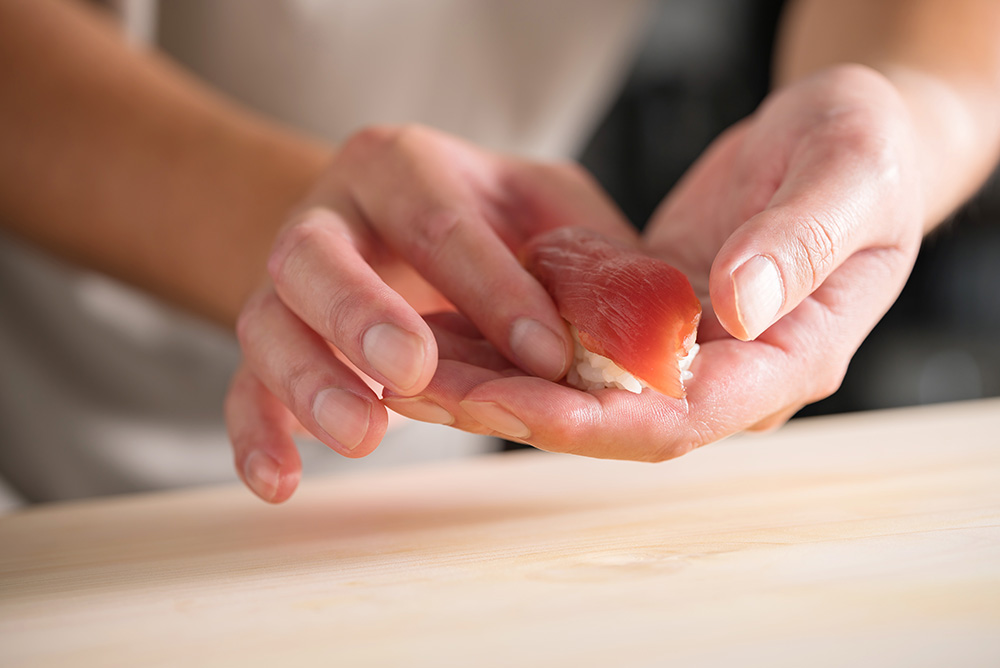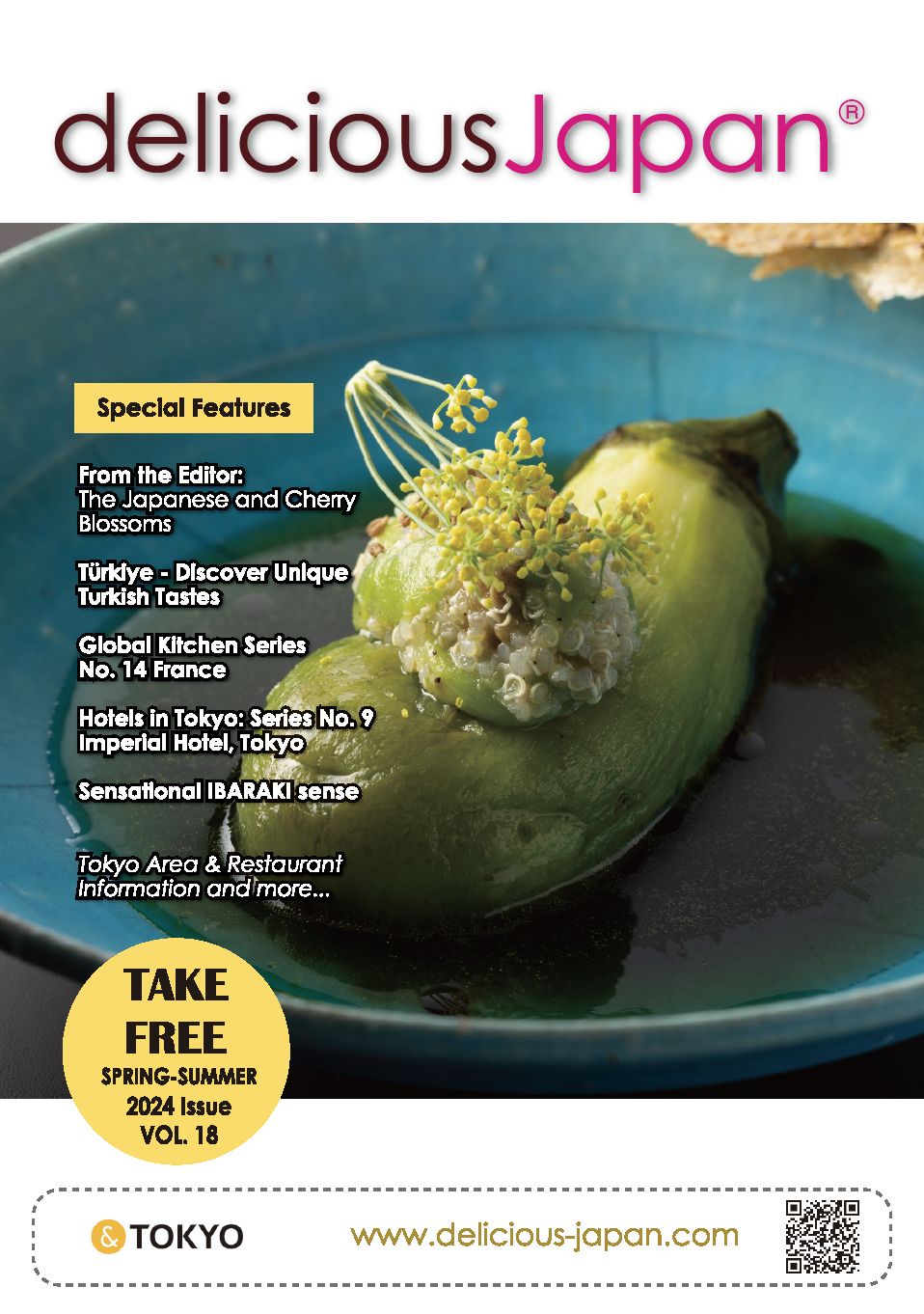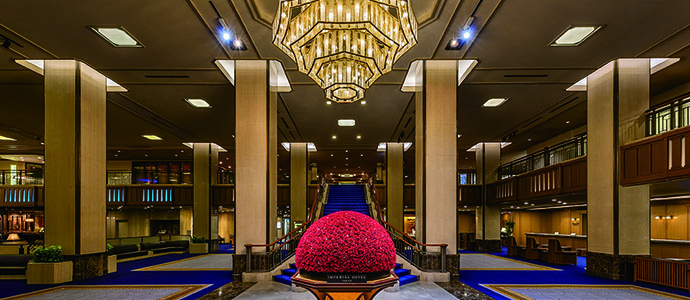
Imperial Hotel, Tokyo
The "spirit of public service" preached by Eiichi Shibusawa, the first chairman of the Imperial Hotel, is at the root of our hospitality.
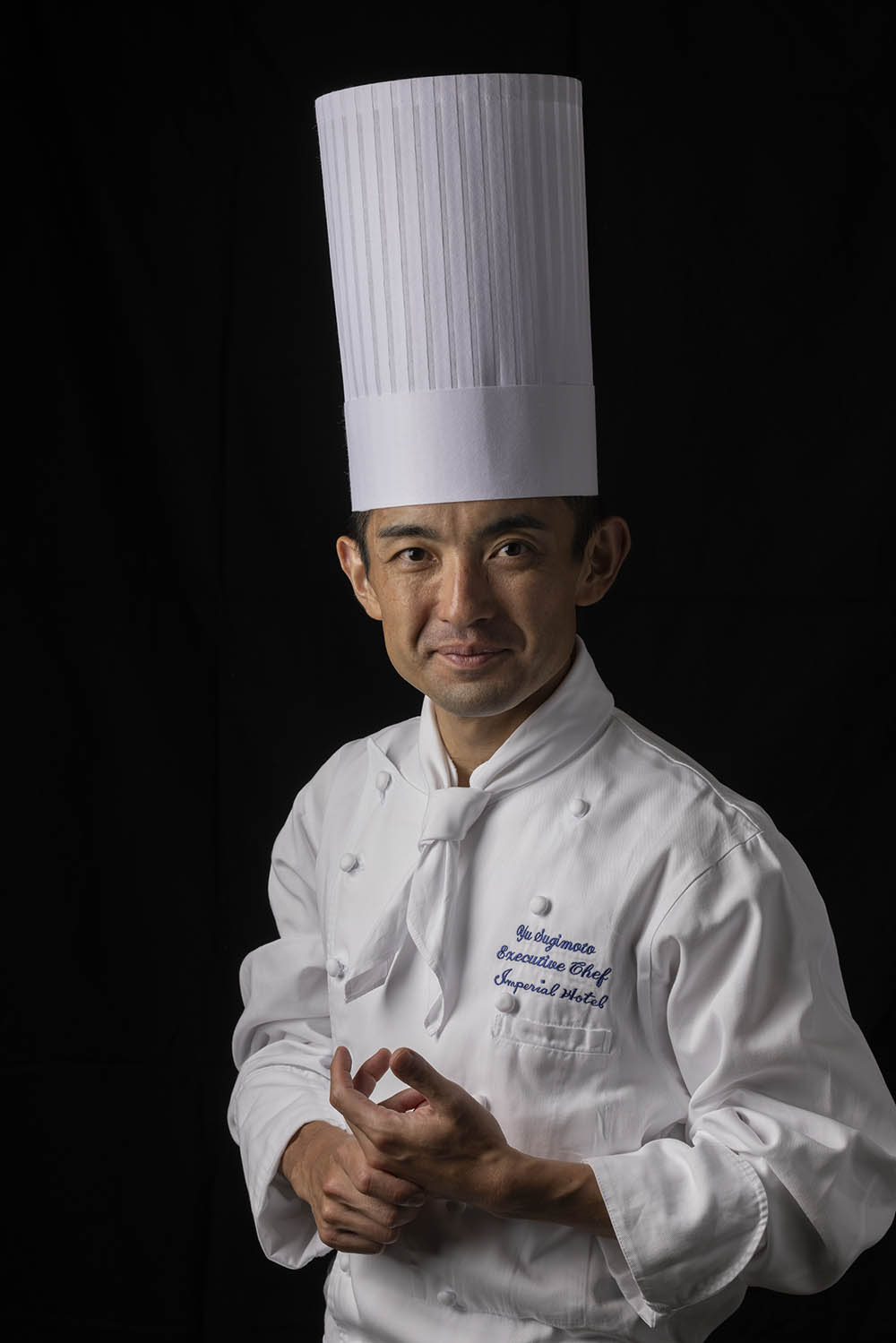
Yu SUGIMOTO
Executive Chef
Imperial Hotel, Tokyo
We chefs are in the profession of creating new dishes and food culture. It is only possible with the right ingredients. Therefore, we must respect the producer and the ingredients and add our hands to prepare them.
What were your goals during your years in France?My goal was to work at the same level as the real French people. I chose France because while working at the Imperial Hotel, I was amazed by the movement, speed, and aesthetic sense of the chefs invited from France. If I were going down that road, I would have to know the real place. But just going to France was not my goal. That is why I quit the hotel. What I was thinking about every day was being able to work on an equal footing with the local people. Also, to step up, I needed to lead local cooks as a chef, so I had to have the appropriate communication skills for that. Since I had no time or money to spare, I studied French independently.
Did you know anyone in France?Since I knew nobody there, I sent about 100 letters to local restaurants to pitch myself and the dishes I made. As a result, I went to the only restaurant that answered with an offer of employment, but I was initially engaged as a server. It was good to see how chef's food was presented to the customers and what kind of wine was being drunk with the food, as those were areas I could not learn just by preparing good food in the kitchen, so it was time well spent. Without that experience, I would not have been able to speak French as well as I do now, which made my life today possible.
Please tell us your most remarkable memory of your time in France.I had the privilege of working with two of France's leading chefs, Yannick Alléno and Alain Ducasse. Their culinary sensibilities are quite different. I was lucky enough to work with them and serve as a chef, which was the most significant thing about my stay in France.
In April 2019, you became the 14th Executive Chef of the Imperial Hotel Tokyo, inheriting "the tradition" of hotel's 134 years old French cuisine. What is "the tradition"?We tend to think of "tradition" as something unchanging and unchangeable, but it needs to adjust with the times. For example, in food, if we compare quality, size, tenderness, and many other aspects to the past, we find they have changed. However, the Imperial Hotel should not change the flavors it offers, so I believe that recipes, which is "tradition", should change according to the ingredients of the time. The environment surrounding food is changing rapidly, including the amount of time people spend on meals, and the amounts and types of alcohol consumed, so naturally we must change as well. I believe traditions are handed down in accordance with the times, and that is how traditions are sustainable.
What is your mission, and what is the meaning of your life?It's all about weaving together the Imperial Hotel's cuisine for the next generation and creating something new. That is what is required of me, and that is my mission.
Inbound tourists have returned. What kind of food experience can they expect at the Imperial Hotel?We are committed to being the best international hotel and welcoming guests from home and abroad. We have a variety of restaurants in the building. Other than French cuisine, which has been handed down at the Imperial Hotel for generations, we also offer authentic Japanese cuisine, teppanyaki, and more, and we hope that our guests will enjoy a variety of dining styles. We also offer a vegan menu to meet the needs of our diverse clientele.
How do you select and procure ingredients on a daily basis?It was considered normal for a hotel restaurant to have a large menu and a constant stock of ingredients. However, after the Covid-19 pandemic, we felt that food procurement should also change. Witnessing the suffering of the producers in the pandemic made me think that the ingredients we have taken for granted may not always be available and accessible in the future.
We would like to change the way we express ourselves, by being more conscious of the selection and procurement of food ingredients, by showing more respect for ingredients than ever before. I frequently visit producers to directly meet with them to listen to their stories and also actually see the land and sea.
The "spirit of public service" preached by Eiichi Shibusawa, the first chairman of the Imperial Hotel, is at the root of our hospitality. It is an accumulation of small movements, but we hope that our hospitality through food will bring happiness to many people.
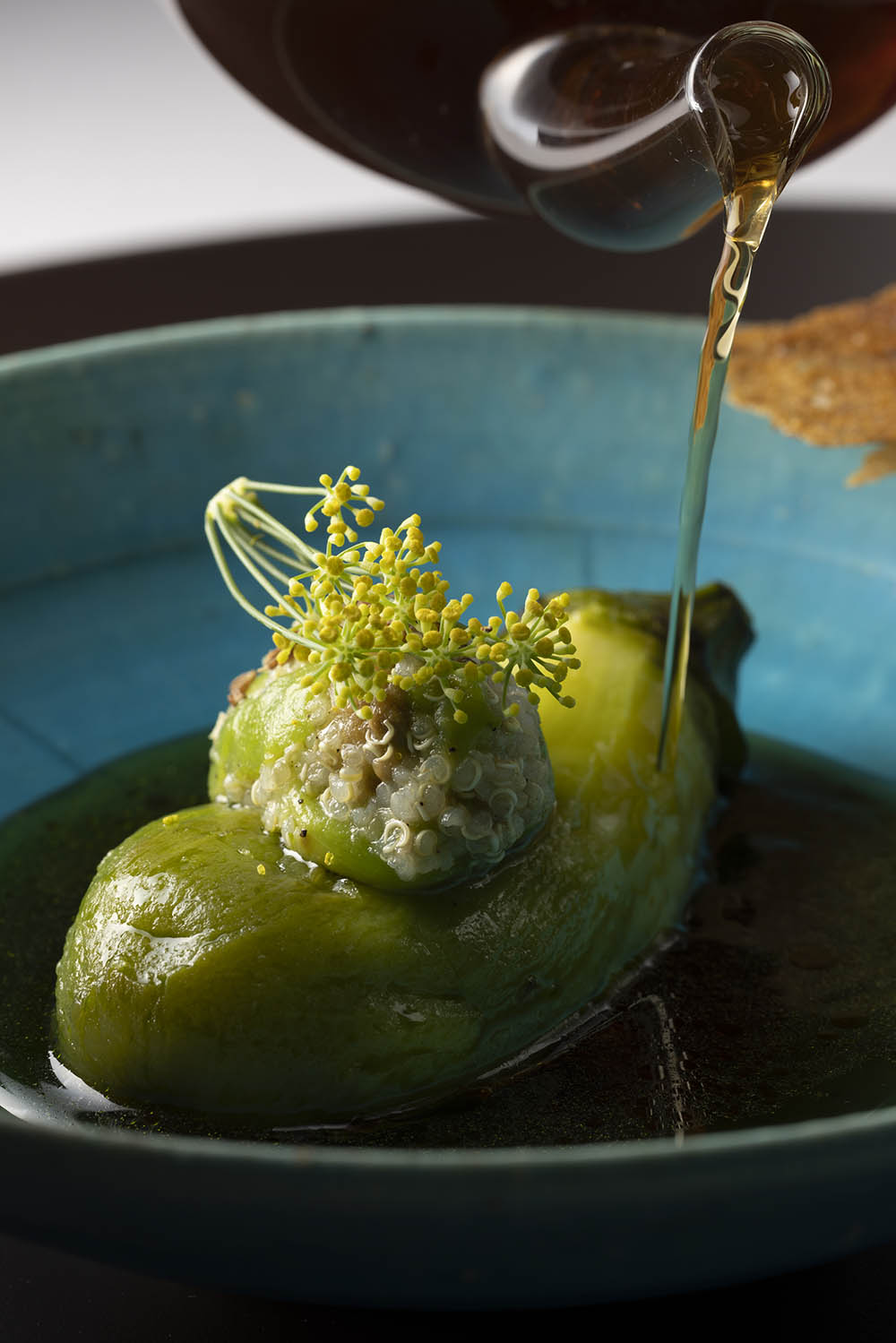
I work to ensure that the Concierge Desk and our staff are easily approachable. Our cordial team are experts at being good listeners and playing an instrumental part in a guest's special moment.
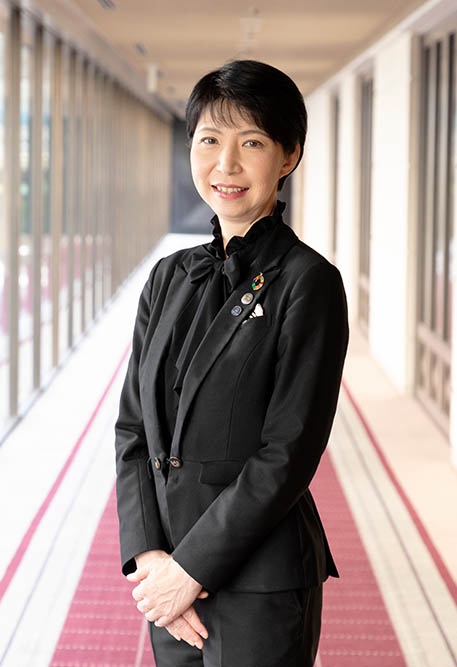
Yono AKIMOTO
Manager, Chief Concierge
Imperial Hotel, Tokyo
While the Imperial Hotel is renowned for its first class combination of tradition and history of over 130 years, we continue to innovate to satisfy ever-evolving guest requests. While Tokyo has seen an influx of various hotel brands, the Imperial continues to be the apex of the hotel industry in both luxury and hospitality. Beloved by dignitaries, loyal patrons and celebrities, indulging guests from around the world with our personalized service and attention to detail is what I look forward to every day. I always see if there is anything that can be arranged for them because it could be a world of difference. Our incredible tenured staff are also the pinnacle of excellence in providing smooth service with a touch of savvy discretion.
Why did you choose to become a concierge?At first, I was assigned to a different section. Two months after joining the hotel, I was transferred to what was then called "Guest Relations" and is now "Concierge". I was genuinely happy because I wanted to work more closely with guests.
I enjoy communicating with guests, such as when they say "thank you" to me, when I help them during their stay after a long and tiring flight, and they leave smiling at the end of their stay, or when I learn about different cultures by listening to them talk about their countries. It is also reassuring to know that by being a member of the Concierge Association, I have friends all over the country who can help each other in times of need. That's the best part of being a concierge and my daily motivation.
Basically, the first time I meet a guest is when I talk to them at the concierge desk. Communication begins amid a complete lack of knowledge of the guest's background, country customs, and culture. Since guests often do not express their true desires based on their backgrounds, it is important to understand and respond to their desires in a way that gets closer to them, but that can be a difficult and challenging task.
What is the most rewarding and enjoyable aspect of being a concierge?When they come back from somewhere I recommended safely, like a restaurant or a tourist attraction, and they say, "That was really good, thank you!," or when they show me their photos and happily share how much they enjoyed their trip. It is worthwhile and gives me a sense of fulfillment.
Do you have any anecdotes of past mistakes or proud moments that you can talk about by now?A concierge often receives inquiries regarding museum information, such as access and opening hours. One time, when I received an inquiry about an art museum, I thought I didn't need to look it up because I had been asked about the same museum the day before, so I gave the same information. But, the exhibition had ended just the day before, inconveniencing the customer. Since then, I have been careful never to make assumptions and always double check before answering.
What about a proud or inspiring story?It was an inquiry from a foreign guest who had lived in Japan 30 or 40 years ago, asking to find someone who had helped him in Japan at that time. The guest was elderly and asked us to help him because it might be his last chance to come to Japan. There were quite a few things that the guest had forgotten, but as I asked him various questions, that led to a certain university. I called and found out that the campus is very close to my grandparents' house. After I connected the dots, it turned out to be a teacher who lived in their neighborhood. The teacher had already passed away, but I was able to connect with his son, and the guest was very happy. After that experience, I began to think about each guest, "Maybe I have some kind of connection with this person I'm talking to", and I listen to them wholeheartedly.
What's the most important thing for a concierge, or the thing you strive to do every day?Being a concierge requires constant improvement. We use guest feedback and surveys to continuously identify opportunities for improvement. Through regular training, we also work on improving our ability to solve problems with enthusiasm or courteously deal with complaints. My goal everyday is to enhance the experience of the guest.
What kind of experience would you like guests to have when they stay at the Imperial Hotel?The hotel's charm lies not only in its history, but also in its privileged location. In front of us is Hibiya Park, the Imperial Palace is a short walk away, and a few minutes' walk behind us is Ginza. I think it is also attractive that you can do a lot of sightseeing with the hotel as a base and buy souvenirs nearby. I'd like guests to stroll around Hibiya Park to relax and get used to the new time zone, and to have a good breakfast at the hotel's buffet restaurant. I recommend the Old Imperial Bar, the main bar with an authentic atmosphere, as the place to unwind in the evening after a day of work or sightseeing. We also have a tea ceremony room called Toko-An inside the hotel, so I hope guests will enjoy experiencing Japanese tea ceremony as a unique part of their stay at the Imperial Hotel.
What is the ratio between foreign and Japanese guests at the Imperial Hotel?While this varies almost daily, our overseas guests make up 50% of our total guests.
Can you tell us the top three questions guests have when they stop by the concierge desk?The first is a restaurant reservation request. Recently, the term "Omakase" (chef's choice) has become popular, and we are often asked for the 'recommended Japanese Omakase'. The second most common question is about sightseeing and tours in Tokyo, followed by people wanting to take the Shinkansen to a regional destination. Most questions are for those three.
What does true hospitality mean to you?Responding to my guests as if they were my own family members. Foreigners cannot read Kanji characters, and the traffic rules are different. I don't think people in that position would understand if I said, "Turn right here and then turn left...," so I try to be polite and give them detailed information. At the same time, I try to understand the guest's thoughts and needs over the course of our conversation, and offer my own extra suggestions to bring them closer to their ideal experience. I hope doing that will make guests feel comfortable opening up to us, and that we will be able to forge a deep relationship with them so they continue to choose the Imperial for future visits to Tokyo. I think that's my way of hospitality.
What is the most memorable thing a guest has said to you?Being told "I came to see you", right after Japan had reopened the border which was closed due to the Covid pandemic. For two and a half years, our guests could not visit us from overseas. Having our patrons back at the Imperial is the most rewarding part of the job.
